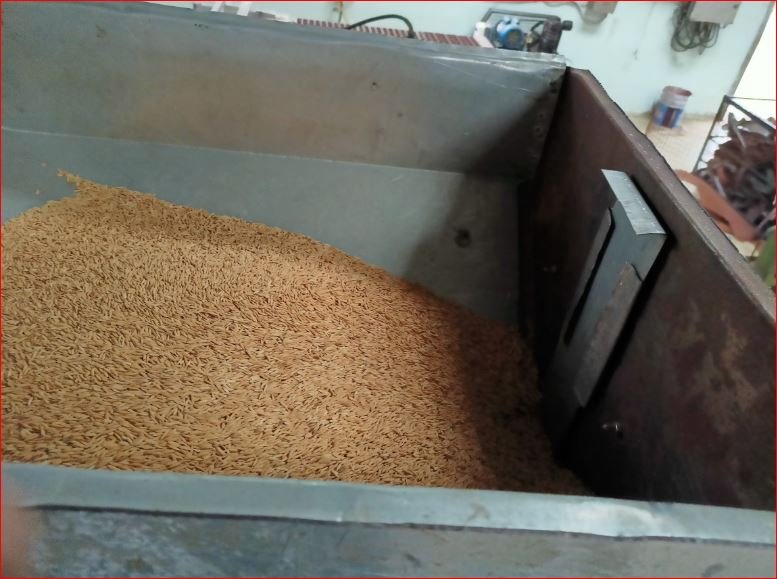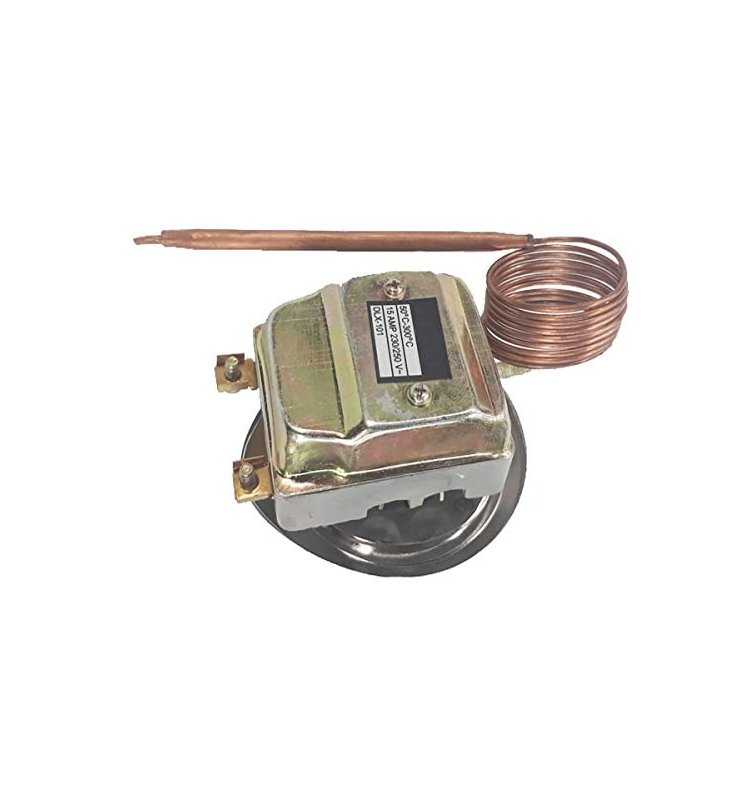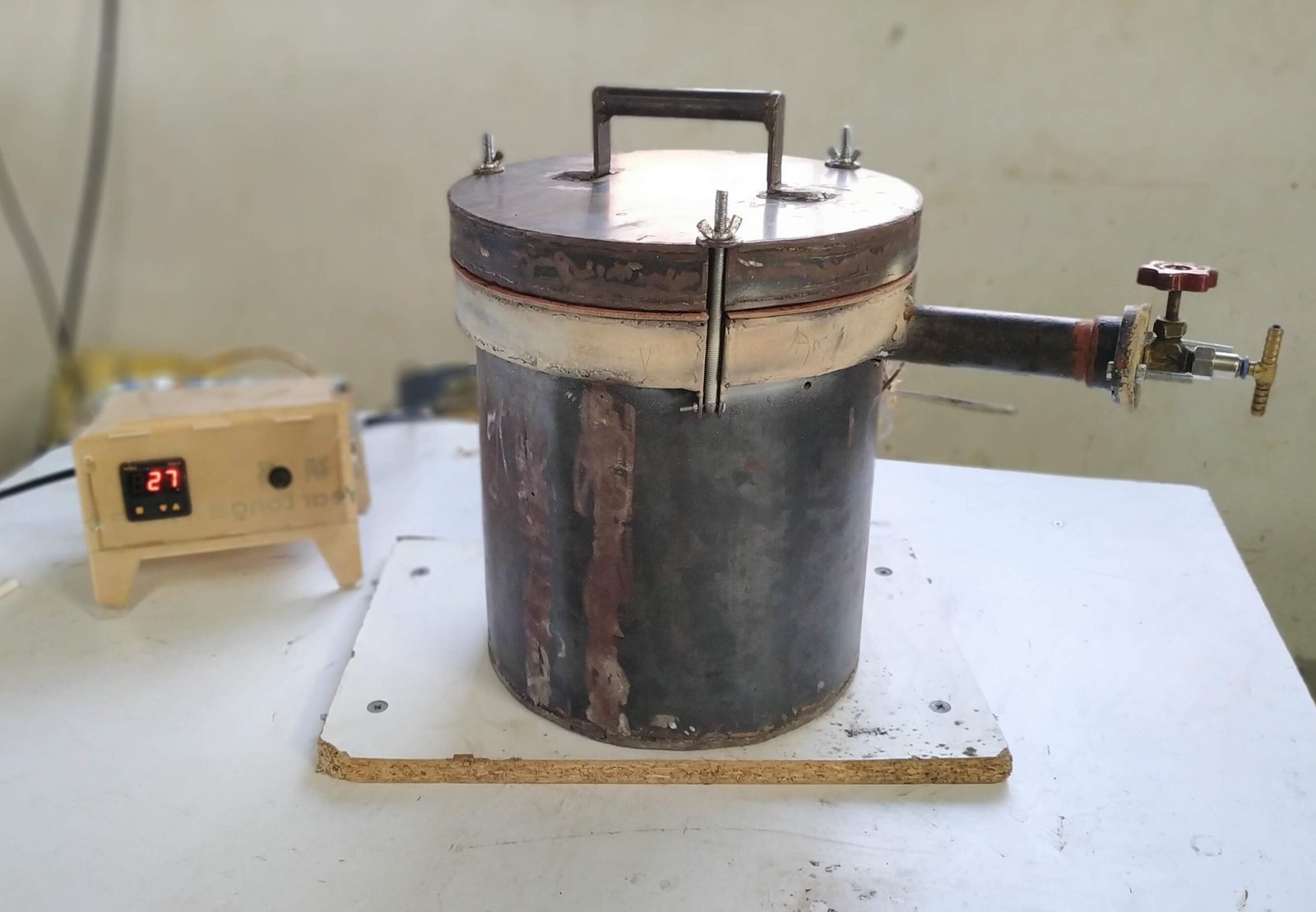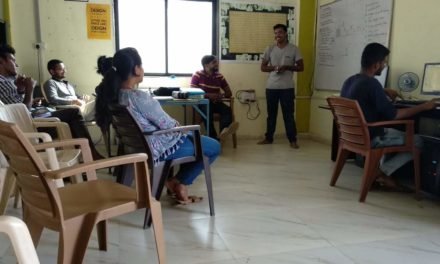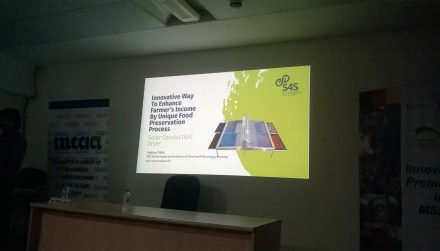Introduction –
Foodgrains are essential dietary components that consist of various nutrients (including vitamins, minerals, protein, and carbohydrates) required for a healthy life and growth of the human body. Rice, Wheat, Maize, millets, and sorghum are some of the major grown and consuming grains in day-to-day diet. These grains are consumed mostly on a regular basis while the cultivation periods or seasons are fixed. The foodgrains are stored after harvesting for consumption up to the next harvesting cycle of the crops. Storage and transport operations up to the consumer are critical tasks. Insects infestation is the dominating factor in the reduction of quantity, and quality of stored grains. Also, the nutritive value of foodgrains reduces due to insect infestation. Moisture is a leading factor to boost insects and pests activities like breading and spread which led to spoilage.
There are several methods for insect control, with varying degrees of success. Some of the methods are not really affordable as well as show adverse effects on the product (grains).
- Fumigation is one of the effective methods considered in which the overall area or container of produce is filled with gaseous pesticides. It has also serious limitations due to its highly toxic and hazardous effects.
- Ethylene dibromide and ethylene oxide also use for grain treatment, but it is now banned in most countries because of there presence as toxic residues in food after treatment.
- Radiation treatment is also a promising method of disinfestation but it costs too high on small scale grain treatments.
- Heating is one of the non-chemical, economical, and feasible alternative method of grain disinfestation.
Considering the requirement of grain disinfestation, various disinfestation methods listed above in short. The heat treatment method for grain disinfestation is susceptible to killing insects. The traditional method of solar grain disinfestation is known but it has limitations in monsoon or cloudy season.
Considering the limitations of solar grain disinfestation the solution is conceptualized, designed, and developed by Bhabha Atomic Research Centre for disinfestation of cereals and pulses. The solution is based on circulating hot air using electrical heating.
Applications of VTD –
VTD can be used for :
- Post-harvest grain treatment by farmers
- Farm producer organizations/co-operatives
- Farm produce traders
- Food storage and distribution authorities
- APMC
- Retailers
- Food (grain) packing SHG’s, etc.
Concept sketch and description –
The proposed system consists of a blower for air supply and heater for air heating at the top of the cabinet. Suspended and inclined trays pivoted with rotating link to the frame. Trays are vibrated using the AC induction motor of 1440 RPM to convey the grains. Grains are fed from topside through the hopper and collected at the bottom after treatment. The cabinet is an insulated box to avoid heat loss. This system is conceptualized for grain treatment with 40Kg/ Hr feed rate. The concept sketch is given below.
The Vibro Thermal Disinfector system is consists of
- Main/outer frame
- Trays of conveyor assembly
- Inner frame and vibrator unit
- Insulated cabinet
- Heater and fan assembly
Details of the systems are described below:
- Main/Outer frame –
The mainframe structure is the main structural element of VTD. Shallow vibrating trays are mounted to the mainframe with the inclination for grains conveying. These trays are mounted using a pin and movable links. All details are shown in the 3D modeling view and detailed drawing as below.
- CAD modeling (3D) –
- Detailed Drawing –
- Fabrication of the outer frame –
The mainframe is fabricated using an MS square tube of 25 mm* 25 mm size and 2 mm thickness according to the detailed drawing shown in fig. 4.
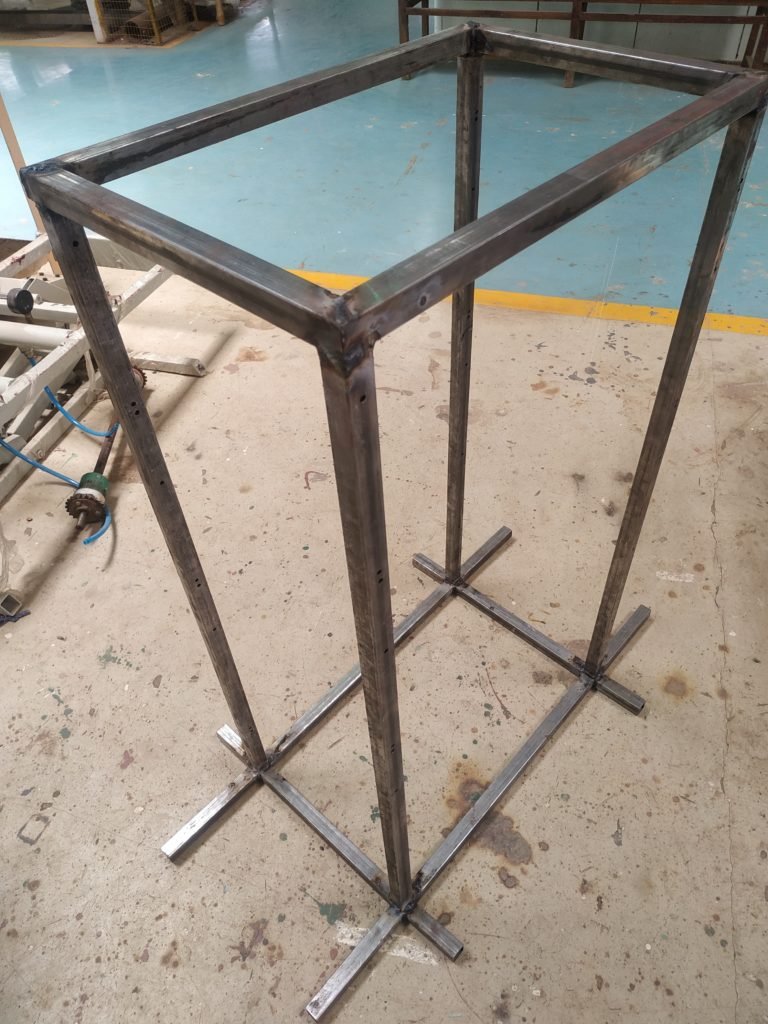
2. Inner frame –
It is mainly for mounting motor as vibrator. With motor on top having eccentric weight to shaft this assembly combinely known as vibrator.
- CAD model (3D)
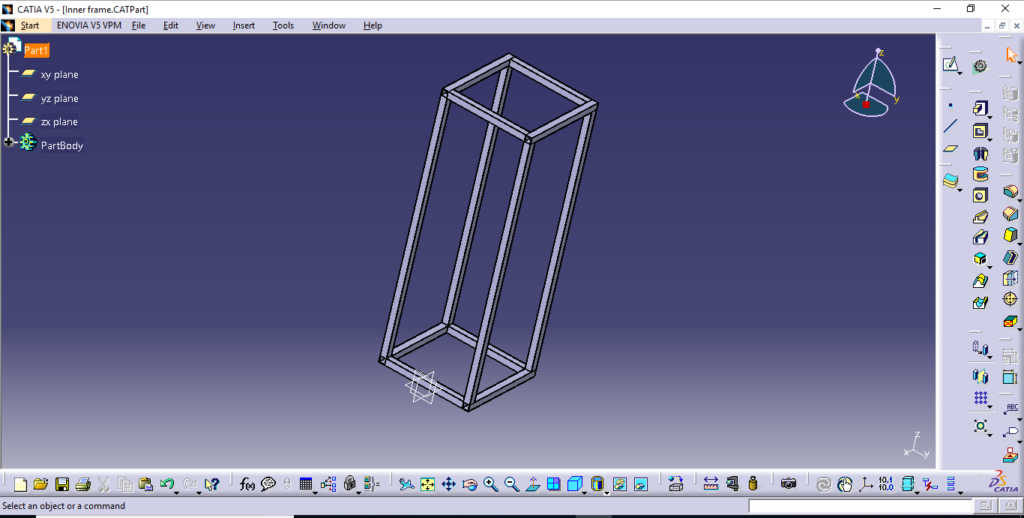
- Detailed Drawing
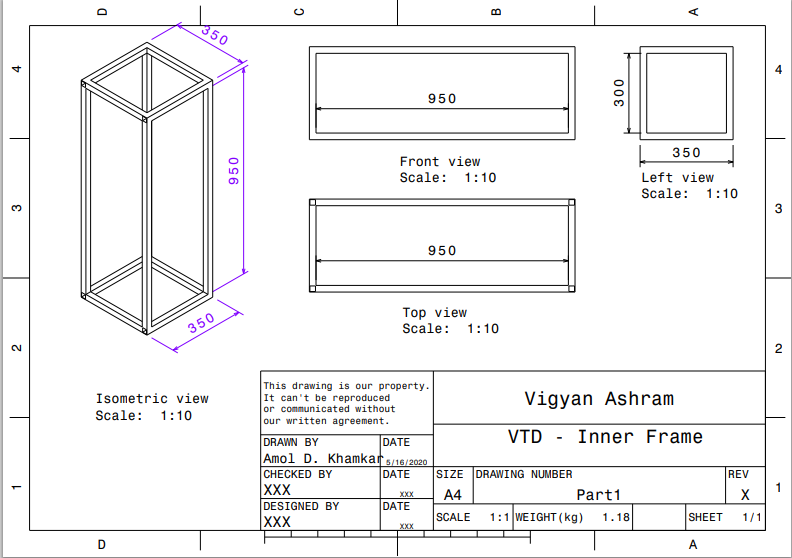
3. Trays of conveyor assembly –
The trays assembly is made of 6 trays for conveying grains from top hopper outlet to collection pan. This trays are mainly assembled to the outer frame using links, tray pins and frame pins. This trays vibrated due to vibrations from vibrator assembly. The slope and vibrations of trays makes conveing of the grains possible.
Top 6 trays known as shallow tray and bottom most tray known as bottom tray. Following is the CAD model of shallo tray made using CATIA V5 R20 Generative Sheet Metal Design module.
- CAD Model (3D) –
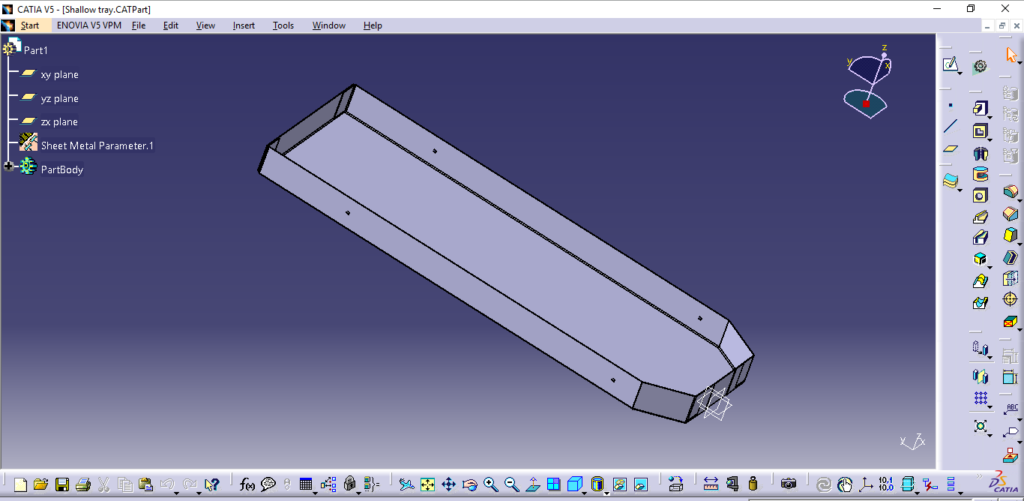
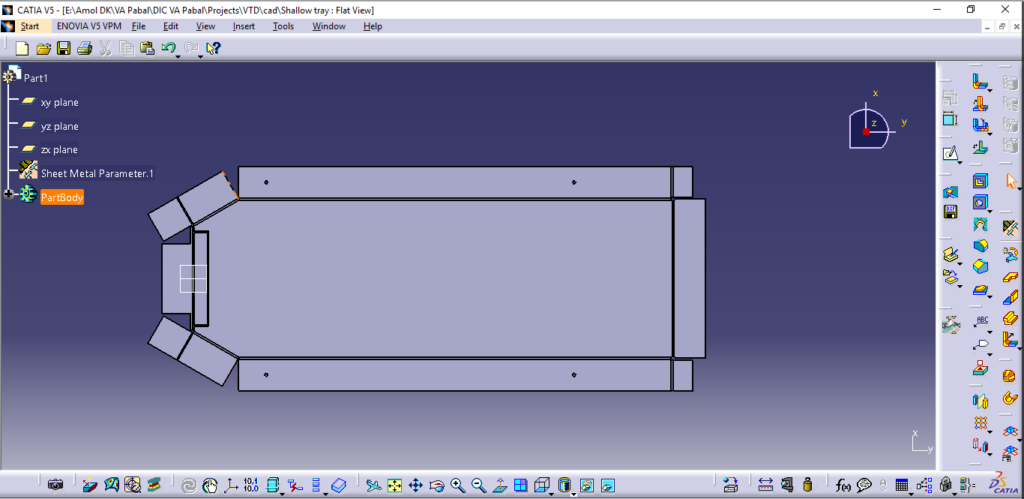
- Detailed Drawing
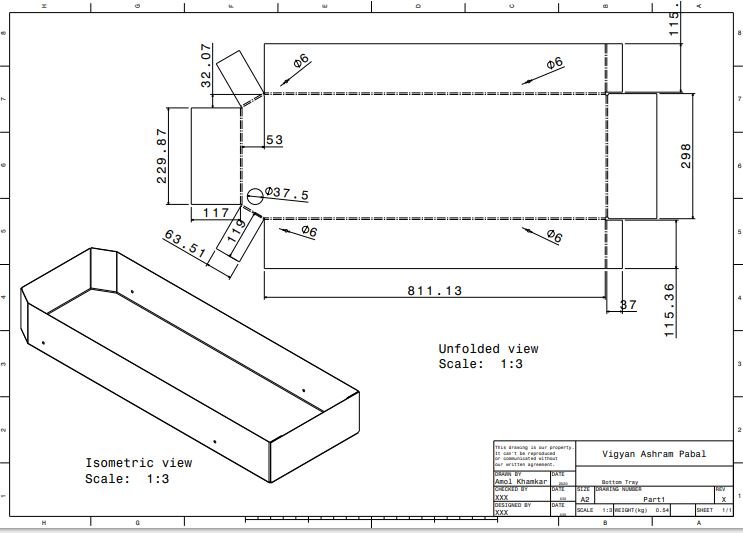
- Actual Vibrator Assembly
Vibrator assembly includes 5 shallow trays for conveying the gains and 1 storage tray at the bottom. The vibrator assembly is activated/vibrated with the help of 0.25 hp AC induction motor. This induction motor shaft is loaded eccentrically to generate vibrations and activate complete system. With this vibrations the grains movement and conveying achieved.
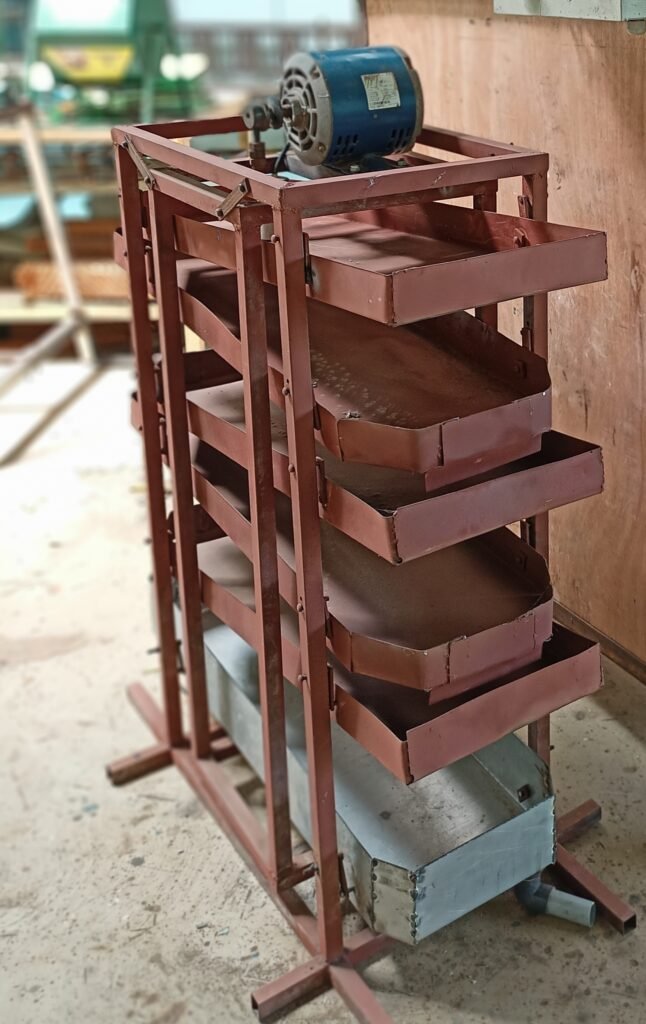
4. Insulated Box
Grains are going to treat at 55 to 70 degree Celsius temperature. For retaining temperature it is required to have a heat resisting/insulated box. Complete vibrator assembly will be inside the insulated box.
- Outer Frame
Outer frame is made in MS L cross section. The box is made with plywood from outside (12 mm thick) and heat resisting foam sheets from inside with 10 mm thickness.
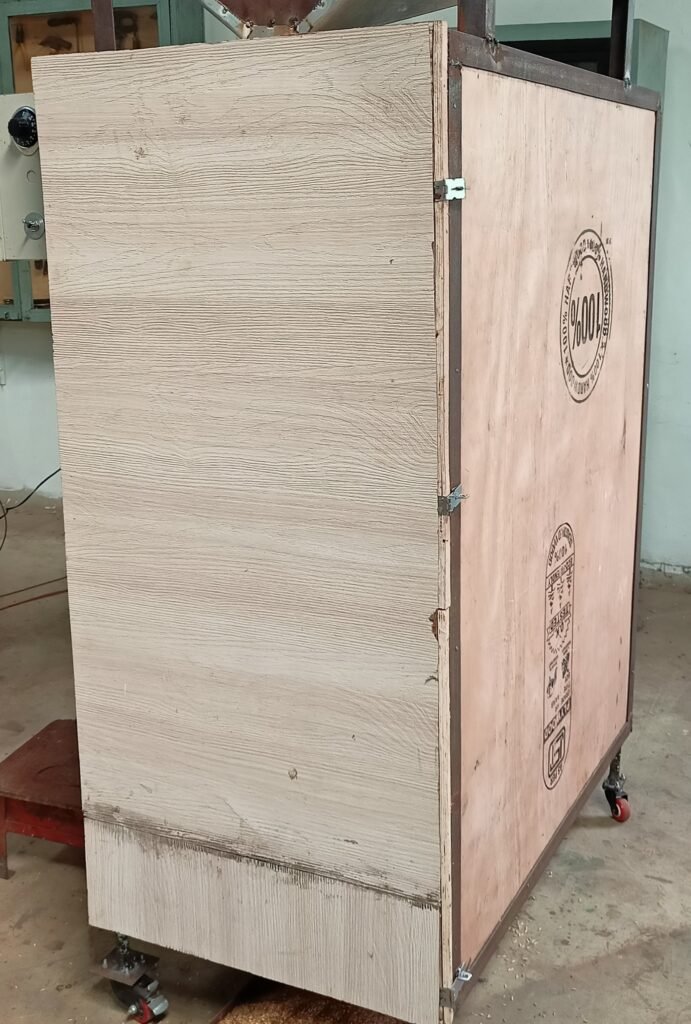
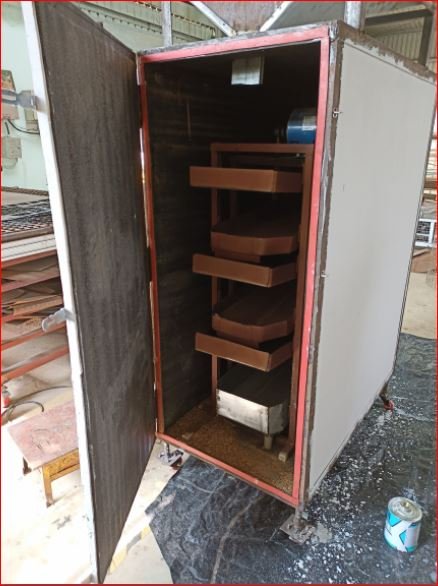
5. Air Heating and Circulation System
For maintaining 55 to 70 degree Celsius temperature inside the insulated box air heating system is made with following components. Duct of PVC pipe and GI box is attached to the main insulated box. Insulated box contains air fan and heater.
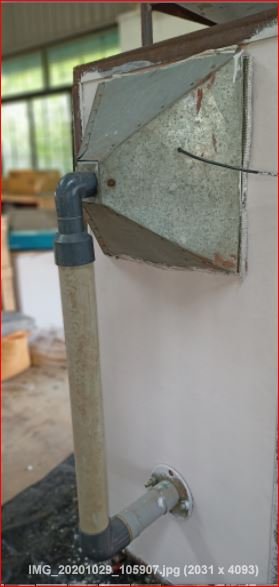
- Indo Fan –
For supply of air on heating element and recirculation. This fan sucks and pushes air in close loop type ducting.
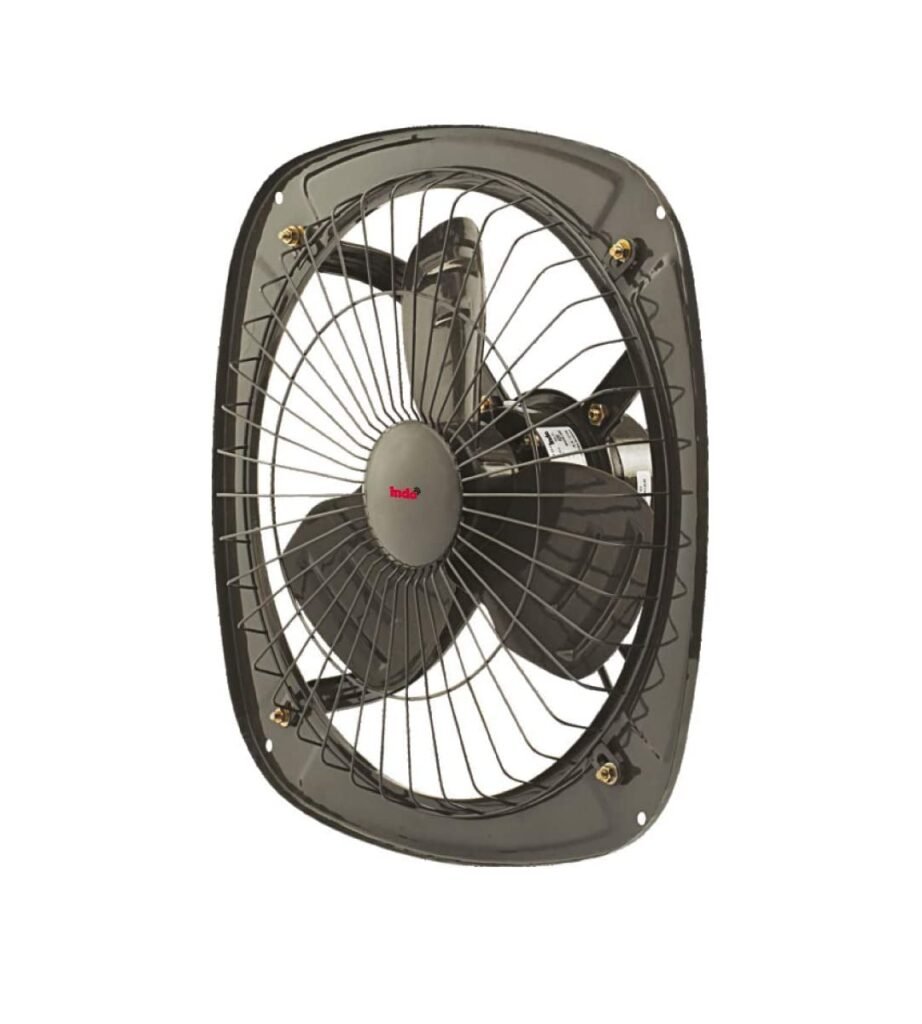
Specifications–
Manufacturer: Indo Hitech Appliances Ltd.
Model Number: Ultra High Speed 12 inch
ASIN: B07RF8B5GX
Power: 85 Watts, 230V AC
RPM: 2200
- Heater
For heating the air supplied by fan U-type heater is used with following details. Heater is mounted in front of fan inside the air heating and recirculation system.
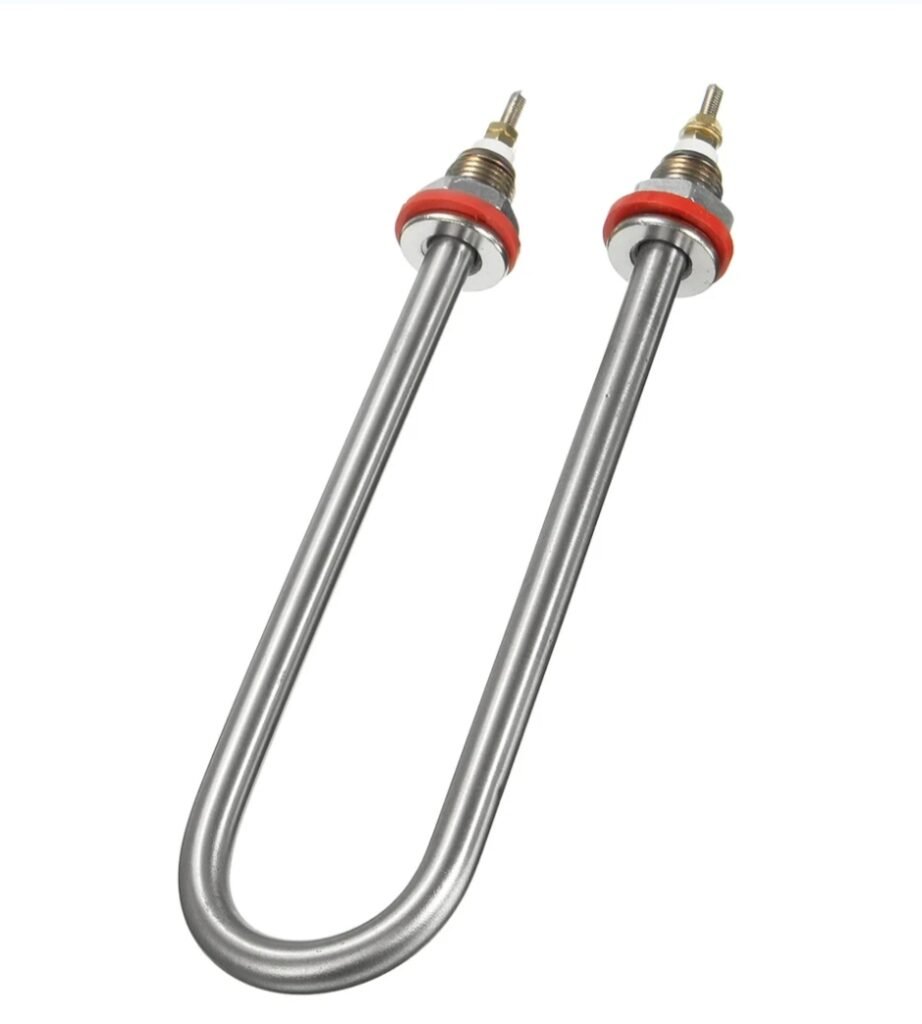
Specifications-
Type: U-type heating element
Power: 900 Watt, 230 V AC
Dimensions: 7 mm Tube diameter, 50 mm center distance, 12 inch length
- Thermostat
To sense and control the temperature inside insulated box it is required to use temperature sensing and control system. There are several options like programmable temperature sensing and control modules (Digital), mechanical switch with temperature sensing probe (Capillary tube type thermostat). Comparing circuit complications and cost capillary tube type thermostat is good option, so it is used in VTD.
Specifications-
Model: Manual thermostat controller
Range: 30 to 200 degree Celsius
ASIN: B08D8F93SJ
6. Hopper and Feed arrangements
Hopper of 70 liters capacity made and assembled at the top of insulated box with mechanical slit type feeding arrangement. For rice with husk the maximum feed rate can be 25 – 30 Kg/hour.
Hopper is made with 1 mm thick GI sheet. Following are the details for hopper design.
- 3D CAD Model
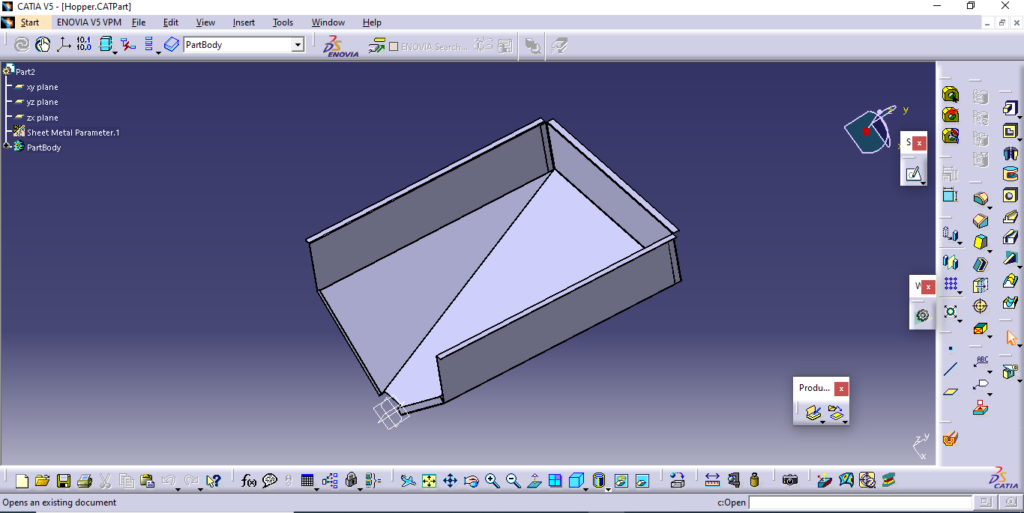
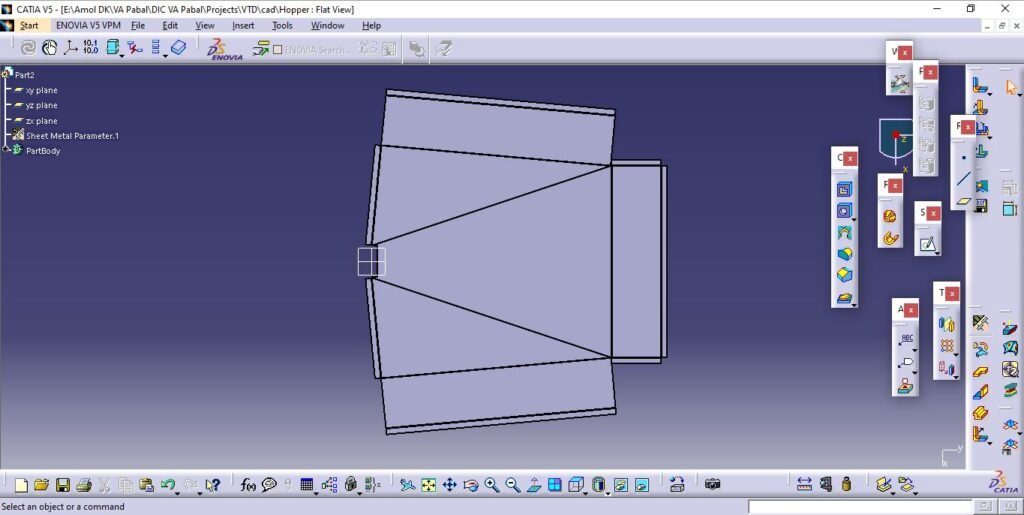
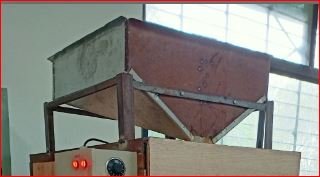
7. Control Panel and Circuit Diagram
Control panel includes emergency switch, motor on- off switch, motor auto run and manual run selector switch, power indicator, heater on-off indicator, Thermostat control knob, heater and air fan on-off switch, MCB.
- Circuit Diagram
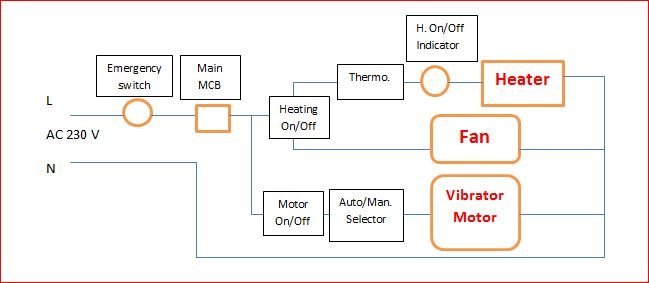
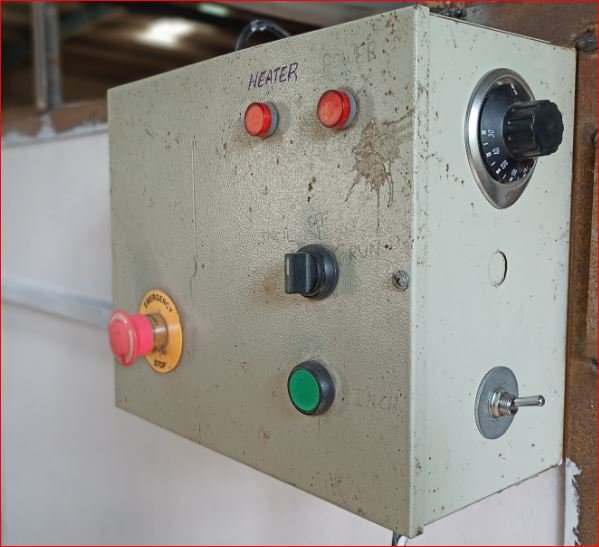
Complete Vibro-Thermal Disinfector Unit
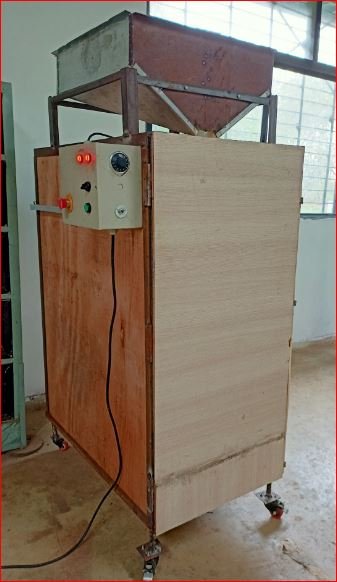
Bill of materials
| Sr. No. | Description | Material/Details | No. of Units | Material Quantity |
| 1 | Inner Frame | MS Square Tube 25*25*2 mm | 1 | 25 feet |
| 2 | Outer Frame | MS Square Tube 25*25*2 mm | 2 | 28 feet |
| 3 | Vibrator Trays | MS CRCA Sheet 1 mm thick | 6 | 50 Sq. feet |
| 4 | Link | MS Flat plate 20*4 mm | 24 | 2.5 feet |
| 5 | Tray Pin | MS 6mm * 2 inch | 24 | 4 feet |
| 6 | Frame Pin | MS 6mm * 2 inch | 24 | 4 feet |
| 7 | Insulated Box Frame | MS L C/S 40*40*4 mm | 1 | 45 feet |
| 8 | Insulated Box | Plywood 12 mm thick | 1 | 80 Sq. feet |
| 9 | Insulated Box Insulation | Foam sheet 10 mm thick (120- 140 degree Celius) | 1 | 80 Sq. feet |
| 10 | Door lock Hinges | SS 3 inch | 3 | 3 |
| 11 | Castors with brakes -2 and without breaks – 2 (2 inch) | STD | 4 | 4 |
| 12 | Hopper | GI Sheet 1 mm thick | 1 | 15 Sq. feet |
| 13 | Hopper Support Structure | MS L c/s 40*40*4 mm | – | 16 feet |
| 14 | Vibrator Motor | ¼ hp AC Induction | 1 | 1 |
| 15 | Air Heating Fan | INDO 2200 RPM, 12 Inch sweeep | 1 | 1 |
| 16 | Heater | 900 Watt U type | 1 | 1 |
| 17 | Ducting | PVC 2 inch | – | 4.5 feet |
| 18 | Control Panel and Electrical Fittings | STD | – | – |
| 19 | Thermostat | Capillary type (30 to 110 degree Celsius) | 1 | 1 |
VTD Trial
Trial on 27 Kg rice with husk done.
Trial taken with 60 degree Celsius temperature.
45 Minutes time required to get 60 degree Celsius temperature initially.
Feed rate – 20 Kg/hour.
